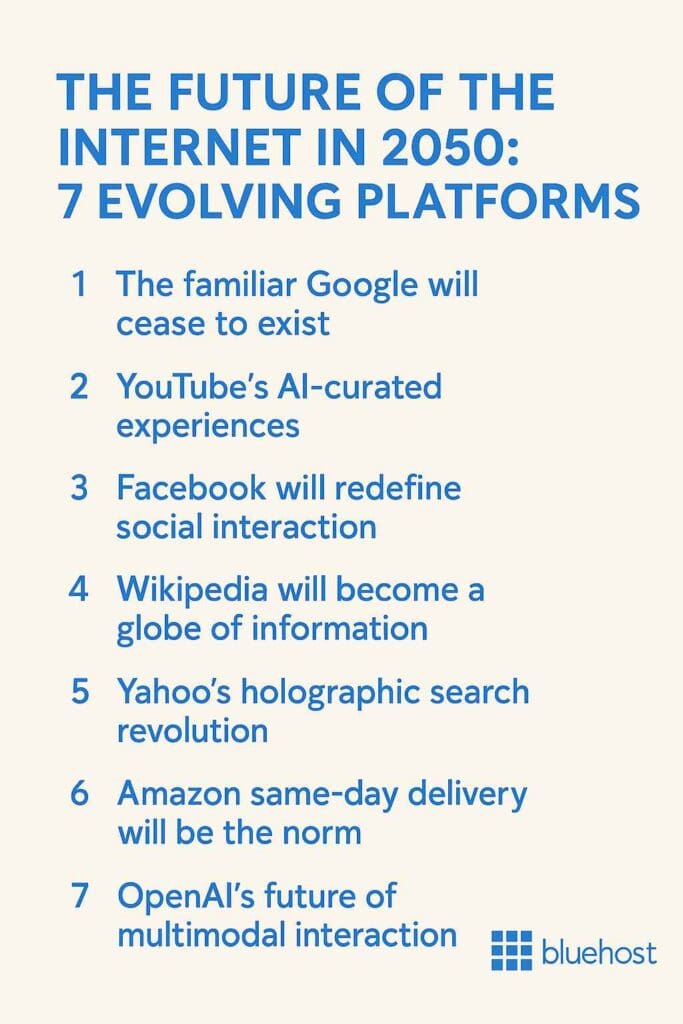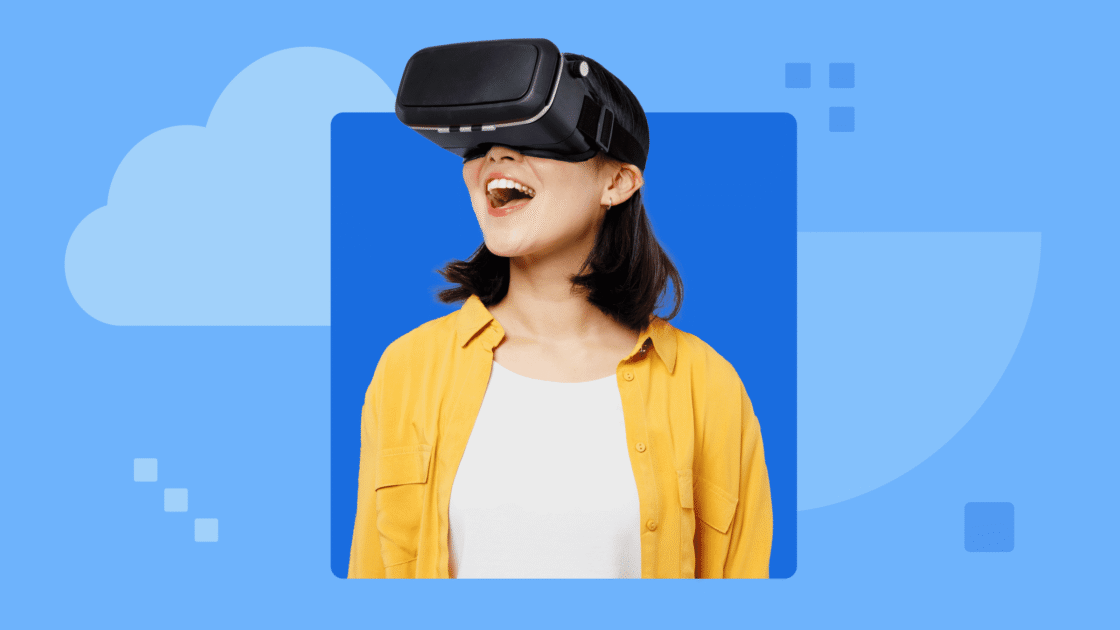key highlights
- Know how the Future of the Internet in 2050 will reshape communication, commerce and global connections.
- Learn how AI-powered search engines, immersive platforms and social media will create personalized, engaging digital experiences.
- Explore how Wikipedia and knowledge hubs will evolve into interactive, AI-guided globes of reliable global information.
- Understand how immersive eCommerce and multimodal AI platforms will transform shopping, collaboration and real-time digital interactions worldwide.
- Uncover how cybersecurity, governance and organizations like the European Commission will ensure privacy, security and human rights online.
Do you remember the screeching sound of dial-up internet? Back then, connecting globally was a marvel. The Internet was slow and text-heavy. We waited minutes for pages to load a single image. It’s a far cry from today’s rapid speeds.
The introduction of broadband in the early 2000s marked a turning point in digital connectivity. We could stream music, watch videos and play online games. Over the past two decades, the Internet has evolved into a multimedia hub connecting billions worldwide. Social media platforms like Facebook and YouTube changed how we communicate and consume content.
As technology advanced, so did our internet experience, like fiber optics, 5G and cloud computing, which made connections faster and more reliable. We transitioned from basic websites to interactive, dynamic pages. According to Statista, there are approximately 5.56 billion Internet users worldwide, accounting for about 67.9% of the global population.
The vision for the future of the internet: A fully immersive experience
This is only the beginning of digital evolution. By 2050, many experts believe traditional computers and phones could be replaced by immersive technologies. The Future of the Internet points toward a world shaped by augmented reality, virtual reality and artificial intelligence.
Imagine users navigating the web through natural gestures, secure voice commands, or even direct brain–computer interfaces. These emerging technologies will create interactive networks that enhance global communication, strengthen security, address challenges and protect human rights in the digital space.
So, what will the future look like? It could be a connected environment where innovation, integration, reliability and user acceptance overcome device limitations and define daily life. The Internet will not just deliver data but offer an engaging, real-time experience for millions worldwide.
The future of the internet in 2050: 7 evolving platforms
The Future of the Internet in 2050 will not just be faster and more secure, it will redefine how humans interact with technology, networks and each other. Driven by artificial intelligence, machine learning, immersive tools and emerging technologies, the web will evolve into a connected, intelligent ecosystem that shapes communication, commerce and global well-being.

Experts expect seven major platforms to transform our digital lives:
- The familiar Google will cease to exist
- YouTube’s AI-curated experiences
- Facebook will redefine social interaction
- Wikipedia will become a globe of information
- Yahoo’s holographic search revolution
- Amazon same-day delivery will be the norm
- OpenAI’s future of multimodal interaction
Let’s take a closer look at these seven evolving platforms to understand how they will reshape the Future of the Internet.
1. The familiar Google will cease to exist
Think of a search engine that adapts to you. With advances in artificial intelligence and machine learning, online searches will get a lot more personal. In 2050, the process of searches won’t be based just on keywords. They’ll consider your past searches, daily routines and even your current mood.
Expect speech and thought-based searches to replace typing. Instead of a list of links, you might see information appear as interactive 3D objects in a virtual world. You could explore these and save useful finds directly into your memory, like an internal conversation with a super-intelligent assistant.
Imagine asking your device a question and having the answer appear as a hologram in your living room. This future search landscape will look quite different from the Google we know today. AI-powered search engines could become the norm, offering a unique, intuitive search performance that feels almost magical.
2. YouTube’s AI-curated experiences
The future of YouTube is exciting! Besides just watching videos, you might become part of them. YouTube will use virtual and augmented reality to create immersive experiences. This means you can interact with the content and guide the storyline as you watch.
Imagine watching a travel vlog and feeling like you’re actually walking through the streets of Paris or exploring the Great Wall of China. AI will suggest videos tailored just for you, creating a viewing experience that’s deeply personal and engaging and designed to achieve immersion. It’ll feel like having your own friendly curator, recommending content based on your interests and viewing habits.
Social features will allow you to watch these experiences with people worldwide, fostering stronger online connections and communities. You’ll be able to share these immersive experiences with friends and family, no matter where they are.
Videos will get an upgrade, too. Expect 360-degree views, interactive widgets and even special effects that might engage your senses of touch and smell. Imagine watching a cooking show and actually smelling the dishes being prepared! Augmented reality will add extra layers of information and interaction to enrich your viewing experience further.
Live streaming will also evolve. You might experience live events from a third-person perspective, offering a new way to experience and share adventures. Imagine attending a concert virtually, where you can look around and see the crowd, the stage and even interact with other fans in real-time.
3. Facebook will redefine social media platforms
Facebook, like other social media platforms, will go beyond just connecting. You won’t just scroll through feeds but step into vibrant virtual spaces. These spaces will let you strengthen communication with friends and fellow enthusiasts in person-like settings. You’ll attend events, play games and participate in activities with a touch or thought.
Imagine attending a virtual birthday party, where you can see, hear and interact with guests as if you were there in person. These virtual spaces will make online interactions feel much more personal and engaging.
The news feed will evolve. It will act as a personal assistant, filtering information and presenting only the most interesting content to you. No more endless scrolling through irrelevant posts. Smart previews will ensure you understand a post’s content before engaging, following design principles that save your time and keep your feed relevant.
Social media platforms will become centers for collaboration. You’ll work on projects together in virtual spaces, fostering a stronger sense of global community. Imagine collaborating on a project with colleagues from around the world, all in a shared virtual office space.
The future of social media looks bright – a place to connect, create and experience the world together in a new dimension!
Also read: How to Improve Social Media Presence
4. Wikipedia will become a globe of information
Wikipedia will transform from a static site to a vibrant, interactive experience. Imagine a homepage with a dynamic globe helping you explore a vast sea of knowledge. As you spin it, articles and information related to specific regions will appear.
Imagine researching a historical event and being able to view interactive timelines, 3D reconstructions of historical sites and even virtual tours. Personalized AI assistants will act as your guides. By understanding your learning style and interests, they’ll recommend articles and insights tailored to you. You’ll get exactly what you need, presented in an easy-to-understand way.
Experts believe a tiny chip might be implanted in your head to store all the information. This might sound like science fiction, but such advancements could make knowledge more accessible, drive ongoing development and personalize it like never before. AI algorithms will constantly add discoveries and review existing content supported by digital architecture to keep it current and reliable.
Global organizations like the European Commission may oversee standards, ensuring access, reliability and digital equality within this evolving knowledge platform.
5. Yahoo’s holographic search revolution
Like other search engines, Yahoo will have a revamped interface. Expect a web experience filled with holographic elements – 3D icons and visuals that float off the screen. These won’t just be decorations. Each section will display important information and update in real-time.
Imagine browsing news stories as 3D holograms in your living room, where you can interact with the headlines and dive deeper into the stories that catch your eye. Instead of scrolling through text, you’ll select what catches your eye and the information will be delivered straight to your brain. This promises a whole new way to consume news and information.
Imagine reading a news article and having related videos, images and interactive graphs appear around you, making the information richer and more engaging. This innovative approach will transform how we consume and interact with information online.
6. Amazon same-day delivery will be the norm
Imagine browsing a store from your couch but examining products in life-like detail. That’s the potential of online shopping with augmented reality. Imagine walking through a virtual store, picking up items and seeing them from all angles before making a purchase, that’s what the future of the internet will give us.
Amazon could integrate AR technology to create 3D holographic displays, allowing you to see products from all angles. This technology will make online shopping feel more like a real-world experience.
The experience could be even more immersive with sensory gloves. Imagine feeling the texture of a fabric or the weight of a gadget while shopping online. This will make shopping for clothes, furniture and other tactile items much more reliable and enjoyable. For clothing shoppers, virtual reality could allow you to try on clothes virtually before buying, ensuring the perfect fit without leaving your home.
And with advances in logistics and drone technology, same-day delivery will become the norm. You could order something in the morning and have it delivered to your door by the afternoon, making online shopping faster and more convenient than ever before.
Also read: How to Use AI to Create an Online Store
7. OpenAI’s future of multimodal interaction
While OpenAI.com currently offers a text-based interface (you type a prompt and it shows results), envision a future where it becomes a dynamic environment for exploration and creation. Think beyond a simple chat window – it will evolve into a space where you can learn, create and collaborate with others in exciting new ways.
This future interface would allow you to interact with AI in various ways, not just typing. Think holographic displays that bring information to life, interactive 3D projections that you can manipulate or simply using your voice to give commands. And who knows, maybe even interacting with AI through your thoughts could become a reality.
Final thoughts
The future of the internet in 2050 promises a fascinating transformation, driven by technological advancements and visions from leading tech giants such as Meta, Apple, Amazon, Microsoft and Google.
Despite the dramatic changes on the horizon, the core purpose of the Internet, sharing stories, establishing businesses and facilitating commerce, is likely to remain and by mid-century, nearly half the population may rely on it daily. This future may seem distant, but if we look in the future, the rapid pace of innovation shows it’s closer than we might think.
FAQs
By 2050, traditional computers and phones will be replaced by advanced devices such as VR glasses, smart earbuds and holographic projectors. The Internet will evolve into a fully immersive experience, integrating augmented and virtual reality with voice commands, gestures and brain-computer interfaces.
Websites will provide personalized content through AI-powered virtual assistants. Learning and interaction will occur via virtual reality simulations. Brain implants may enable direct access to vast information, connecting people seamlessly between digital realities and the physical world.
Cybersecurity in 2050 will leverage artificial intelligence, machine learning and blockchain technologies for real-time threat detection and prevention. Quantum computing will further enhance encryption and data protection.
The Internet infrastructure will be designed for rapid recovery from cyberattacks. As remote work continues to grow, robust security policies and continuous training will effectively safeguard digital environments.
Privacy will be a fundamental human right protected by global regulations akin to GDPR. Businesses will implement advanced AI and blockchain technologies to secure personal data and enhance user control and autonomy. Increased privacy education and digital literacy will empower individuals to proactively safeguard their information in the evolving future of the Internet.
Regulation will prioritize enhancing internet safety, fairness and digital equality. Stricter measures will target cybercrime and misinformation. International agreements will coordinate governance to ensure ethical use of emerging technologies. Business models will evolve to comply with privacy and security standards, fostering trust and protecting human rights.
Individuals should develop digital literacy and stay adaptable to evolving technologies. Acquiring skills in programming, data analysis and cybersecurity will enhance their ability to navigate the future Internet.
Embracing new tools and platforms while practicing strong internet safety and privacy habits will be crucial. Connecting with experts and diverse online communities will help more people stay informed and engaged.
The future internet will deliver immersive, predictive and context-aware experiences. Powered by artificial intelligence, virtual reality and the Internet of Things, it will respond to user gestures, analyze behavior patterns and provide hyper-personalized content tailored to individual needs.
Decentralized technologies like blockchain, peer-to-peer protocols and self-sovereign identities will enable secure, user-controlled internet experiences. This shift will reduce dependence on tech giants, enhance privacy and build trust in digital interactions, shaping the future of the Internet.
Satellite internet, low-earth orbit networks and mobile edge computing will expand broadband access to remote and underserved regions. This widespread connectivity will enable millions to join the global digital economy, promoting digital equality and bridging the digital divide.
Artificial intelligence will shape the future of the Internet. So, what might the Internet of Things do in the future? It could enable predictive, automated systems in homes, cities and businesses. AI-powered virtual assistants and predictive browsing will create a more intelligent, responsive and user-centric online environment, enhancing the overall customer experience.
Experts foresee AI as a core technology that will replace traditional computers with immersive devices integrating augmented and virtual reality. This evolution will enable seamless interaction between digital realities and the physical world, shaping the Internet future.
Websites will evolve into interactive digital realities incorporating augmented reality, 3D content and gesture-based navigation. Users will interact with AI-driven avatars and real-time virtual simulations, transforming static pages into dynamic, immersive experiences that blend digital realities with the physical world.
The Internet will employ quantum encryption, blockchain authentication and AI-driven threat detection to enhance cybersecurity. Networks will be self-healing and resilient, providing robust protection against cyberattacks and systemic failures.
Users will manage their digital identities via decentralized blockchain wallets. This approach ensures transparent, consent-driven control over personal data, privacy settings and online credentials, aligning with the future of the Internet’s emphasis on security and user empowerment.
By 2050, the internet will:
– Operate through brain-computer interfaces
– Utilize green cloud infrastructure for sustainability
– Employ quantum communication protocols for security
– Deliver AI-curated, real-time digital twins for every user



Write A Comment